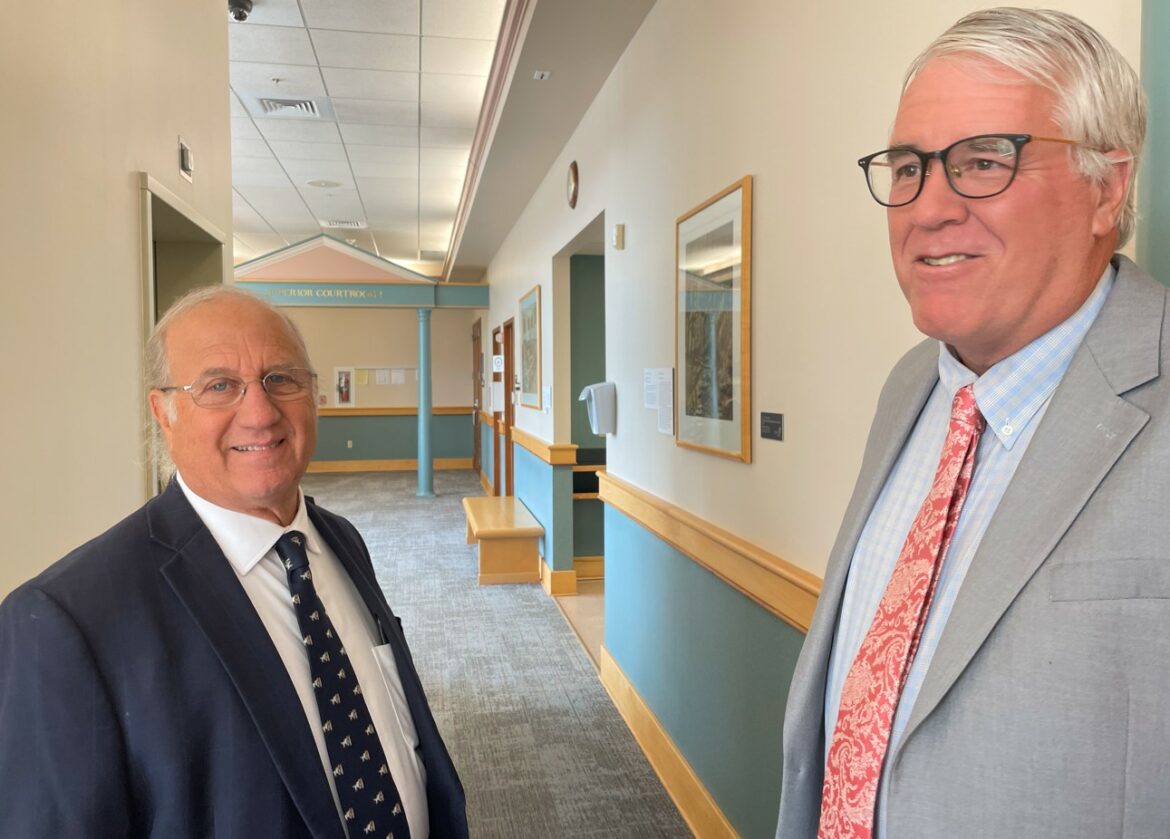By NANCY WEST, InDepthNH.org
CONCORD – The woman who accused ex-state Sen. Jeffrey Woodburn of domestic violence was investigated by the Attorney General’s Office for text messages she sent to the victim advocate about jury deliberations after his March mistrial.
The jury couldn’t reach a unanimous verdict on the simple assault and domestic violence convictions that had been remanded back to Coos Superior Court after the Supreme Court ruled Woodburn should have been able to argue self-defense.
There are also two other convictions that Woodburn, of Whitefield, appealed that are still pending before the Supreme Court. If the court rules against him, Woodburn could be required to serve 30 days in jail.
In May of 2021, a jury found Woodburn guilty of four counts and not guilty on five charges, all misdemeanors, after deliberating for less than three hours in Coos Superior Court.
The crimes were alleged to have occurred between December 2017 and June 2018 when Woodburn and Emily Jacobs were engaged and both active in the Democratic party.
The attorney general’s investigation by Todd Flanagan found that Jacobs asked the wife of a friend to speak with one of the jurors in the case right after the March mistrial and then texted messages about the deliberations to the Attorney General’s victim advocate, Lynda Ruel.
The messages from Jacobs to Ruel painted the jury as conflicted with the men and women sometimes at odds.
“The other quote I didn’t write was that dispute the ‘crazy female juror’ had with one of the male jurors. She apparently told the male juror ‘don’t call me darling.’ He said, ‘I’ll call you whatever I want.’ Sounds like this male juror and maybe other male jurors acted on Sisti’s misogynistic courtroom culture of putting the victim on trial, behind the scenes,” Jacobs texted Ruel.
In other texts attached to Flanagan’s report, Jacobs said: “’He was trying to make a death stare with all of us’ until he won.”
Others said: “It was very heated.”
“It was 7-5”
“First 9-3”
“It was nerve wracking, volatile back there.”
“There wasn’t one person who didn’t think he was guilty.”
“It seemed like she was on trial.”
“Also the word ‘reasonable’ was very confusing to the jurors,” Jacobs texted.
Jacobs could not be located for comment Friday.
The Attorney General’s Office released Flanagan’s redacted report this week to InDepthNH.org on a right-to-know request, but declined to say why the investigation was conducted.
“No charges have been filed,” said Mike Garrity, spokesman for the Attorney General’s Office when asked for more details.
“DOJ Investigators have reviewed the matter, and we cannot comment beyond the report,” he said.
Flanagan said he was asked to reach out to Jacobs by the trial team to discuss the texts she sent to Rule.
“Ms. Jacobs had somehow gained information pertaining to issues involving jury deliberations, that appeared to be specific enough to likely have come from a jury member,” Flanagan wrote.
He took screenshots of the text messages and spoke to Ruel on March 18, before reaching out to Jacobs.
“Ms. Ruel advised that the trial concluded on the afternoon of Wednesday March 13th. The jury then began deliberations, which ended the following day (Thursday) at about 12:30 PM in a hung jury.”
After the hung jury, the prosecution team explained to Jacobs that the state had to wait 30 days before it could engage in any communication with the jurors, he wrote.
“The following afternoon, Ruel began receiving text messages from Emily Jacobs with specific details concerning deliberations in the jury room,” Flanagan wrote.
The text messages continued into Friday and Saturday.
On Monday, March 18, Flanagan called and spoke with Jacobs, advising her he was following up on the text messages. He asked who was providing the information and she told him it was the wife of a friend of hers who knew one of the jurors.
“I asked Ms. Jacobs if she herself ever had direct contact with that juror or with any juror and she said no,” Flanagan wrote.
He also asked the wife of Jacobs’ friend who said after the trial Jacobs told her that the state could not communicate with the jurors for 30 days “but that there was nothing precluding” her from reaching out to (the juror) if she was comfortable doing so. The juror’s name was redacted in Flanagan’s report.
The woman began communicating with the juror and passing information on to Jacobs who relayed it to Ruel, Flanagan said.
Woodburn’s attorney Mark Sisti said he didn’t know why Jacobs was investigated since it didn’t appear illegal for someone to contact a juror after the trial. However, prosecutors are not allowed to contact jurors until at least 30 days after a trial ends.
Sisti said the Attorney General’s Office did the right thing by investigating if they were concerned about any possible juror interference.
“I think they had” to investigate, Sisti said.
If a juror was being contacted by Jacobs’ friend’s wife at the request of the Attorney General it could appear she was acting as their agent, which the investigation found was not the case.
Attorney General Formella has concluded that the state will not re-try Woodburn on the simple assault and domestic violence charges after the mistrial.
“After prosecuting this case for nearly six years and two jury trials, I do not reach this decision lightly. Domestic violence is a serious, ongoing issue that must be addressed with the utmost care and resolve,” Formella said in a news release in May.
“With the decision not to re-try Mr. Woodburn on the simple assault and domestic violence charges, those charges will be dismissed. It is anticipated that Mr. Woodburn will be incarcerated for 30 days pursuant to his prior convictions once his appeal of those convictions is concluded,” Formella said.





